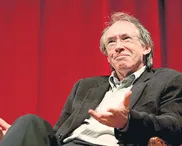‘It’s woman against man. Now and ever has been.’
The BBC’s recent adaptation of Parade’s End pits men against women, restraint against impulsiveness and duty against desire.
Keeping up appearances
Parade’s End is based on a collection of four novels by the ‘literary impressionist’ Ford Madox Ford. The books chart the life of ‘the last decent man in England’, Christopher Tietjens (Benedict Cumberbatch), as he pledges to remain faithful to his mesmerising and manipulative wife Sylvia (Rebecca Hall).
Sylvia is cruel and tempestuous, but despite her harsh exterior she is ‘soppy about him’. Her greatest longing is to stir her husband’s affection, or at least provoke a reaction from him through her numerous infidelities. He, however, is wedded to his ideals of restraint and decorum, refusing to become jealous or condemn her behaviour. Sylvia is led by her personal passion; Christopher is a backbone to a society which is always behaving ‘properly’, yet tragically represses all hints of genuine feeling.






